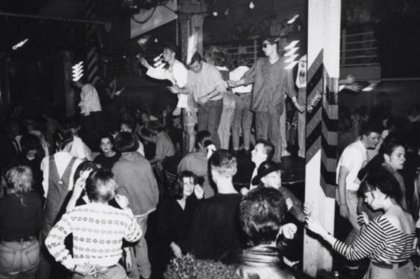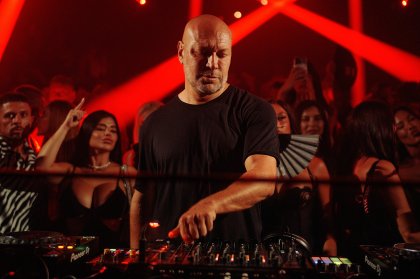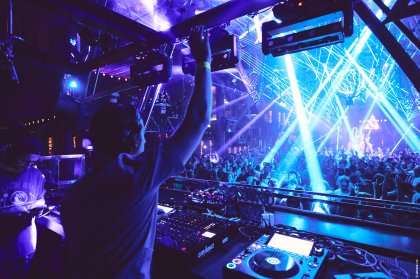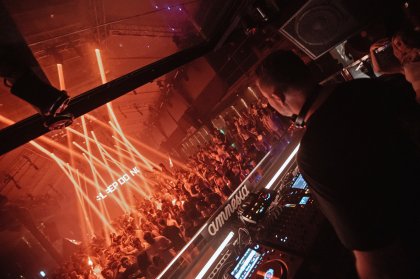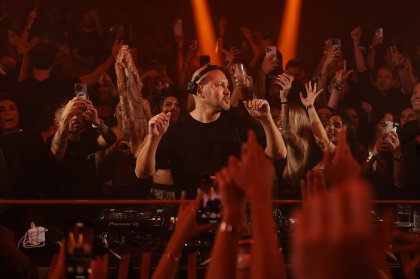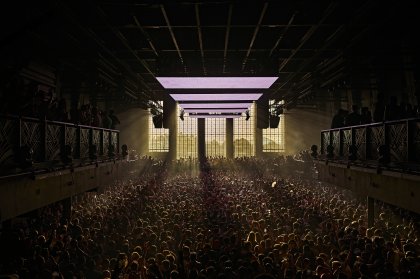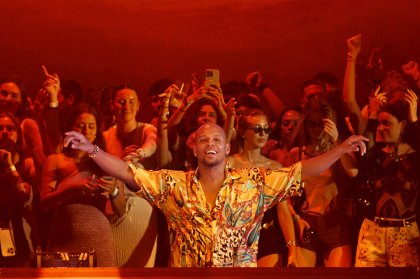International DJ, cutting-edge producer, founder of Plink Plonk, End Recordings and the Superfreq label and event brand, frontman for The Shamen and co-owner of now-defunct nightclub, The End, Mr. C is as accomplished as they come from the within the dance music community.
Born Richard West in North London, he's been collating an ardent, music savvy pack of patrons for nearly three decades. His informed fanbase and anyone who has a genuine interest in the formative years of clubbing culture will know that the introspective maverick emerged as a pioneering force in the acid house scene in 1987. While some of his peers of that era have not held onto their relevance, his position as an authoritative figure within the underground dance music scene has long been stabilised.
Based in LA for seven years, he divides his time between the Californian state and far reaching corners of the globe, with gigs from Ecuador to Sydney. One destination where he's been making regular appearances is – you guessed it – Ibiza. This sun-soaked, music-drenched island was once the home to his own residency, Superfreq, and this season he was lured by the sounds of acid and Balearic house with Dance 88/89 at Sankeys.
We caught up with the straight-talking warden of the underground community at a time when clubbing culture is under threat, not just in London with the closure of fabric, but globally. As expected, he's doing a lot more than just talking out against the groundless oppression, as in the case of fabric, he's injected funds into the club's fundraiser with money raised from a recent gig at The Steelyard.
From dance floor persecution and Ibiza's acid house revival to living the good life in LA and the psychology of method acting, Mr. C gave me plenty of ammo for discussion. Dig in and enjoy because he's as informative as he is engaging.
As a dance music veteran who's had a solid relationship with the underground clubbing community for nearly 30 years, do you feel a certain responsibility to take a stand and keep the scene alive in light of fabric's revoked license?
"Well, yes. As one of the founding fathers of the acid house scene and rave culture in the UK, I do feel a responsibility and a duty to help wherever I can. As far as fabric is concerned, I've been doing my Superfreq parties there for four years now, so I've built up a very good relationship with the club and I've had some great nights there. They've been working for 17 years to bring in underground music with good DJs, and to educate London. Of course, I was one of the owners of The End and we were fabric's competition for many years, but that doesn't mean anything - what's now important is that London clubland is looked out for and taken care of, and that the UK's clubbing community takes a stand and gets behind fabric. Because if fabric don't win this court of appeal, not only will they close down shop and lose a lot of money - and that will be the end of a clubbing institution that supports quality cutting edge music - but it will also have dire consequences for the whole of the UK in the way that authorities will now have a new yard stick to be able to close down clubs, and police will be able to go in and do what they want carte blanche, which is pretty disgusting really."
It echoes what happened in Glasgow with The Arches, which was a huge loss to the city and Scotland.
"That's right, exactly the same, and that was disgusting as well. As we all know, The Arches was a cultural centre, not just a nightclub. It did lots of great work and for it to have its license revoked just because of the authorities being idiots - it's a joke. Look at what's going in Berlin with how the German government are standing up and saying Berghain and Berlin clubs are part of the culture and the fabric of the city. They recognise that this is modern culture at its finest and not only give licences for the clubs, but they support the scene with grants, as they do in Holland as well. So it's a shame that British authorities are being so short sighted and not actually helping, instead, they're hindering."
It's shocking considering that if you look at more commercial clubs - where there isn't such a focus on music and bringing together a community - there's often more cases of alcohol fuelled violence. How does that make you feel as someone who witnessed dance music's ability to stop violence and unite people in the late '80s?
"It's an affront to our culture, our society and our youth. I think the authorities have got very short term memories. If they go back to the acid house culture that kicked off in 1988, you only have to go back a year before that to 1987 and in London there were pitch battles on the streets. The nightclubs were warzones. You'd have gangs from North London, East London, South London and West London pitching battles under Waterloo Bridge. London was a warzone every Friday and Saturday night. People getting stabbed, people getting hurt. This drug that everyone is all so against - MDMA - came in and completely killed all of the hooliganism. It stopped the violence. A new culture was born. It was a culture of love, a culture of peace and a culture of the celebration of life. And now they're trying to come down on that."
You've taken a track from your new album and upgraded it with some verses about what's happening to clubbing culture in the UK. Can you tell us a little more about the track and what you hope to achieve with it?
"It's called 'Stand Up', and what I´ve decided to do is to get it remixed by as many DJs as possible. The track is about standing up to the man and not letting him push us around and it was basically just a chorus vocal, but since what's happened with fabric, it's going to have poignant verses about the demise of clubland due to overzealous authorities and the money men taking property spaces. This stuff that we're seeing happening in London at fabric has been happening all over the world. Our culture is being persecuted by the authorities the world over, so it's about time, as artists, that we stood up and did something as well. The track will now be included in a brand new fabric compilation album with many artists who feel passionately about the club's closure and who have played there and will also be contributing to the album. I'll be getting 'Stand Up' remixed remixed by Omid 16B, Alexi Delano and Jay Haze."
"I think youths have got stuck in their smartphones. They think that making a Facebook status update or Twitter tweet is them having done their bit and it´s become a joke. It´s like people don´t want to stand up and be counted anymore."
fabric's closure in response to drug-related deaths has really put this failing war against drugs in the limelight. It's clear to you and millions of others that the authorities have a complete misunderstanding about the culture and their solutions aren't working. What do you feel the approach should be?
"I really don't know. What I think should happen and what I think will happen are two completely different things. Just to emphasise, this is a worldwide problem. In Argentina, there were five deaths at the Timewarp festival earlier this year. The judge has taken it upon himself to make all electronic music illegal in nightclubs. Clubs have to have someone on guard watching for police and if police turn up they have to switch from playing house or techno to disco or funk, otherwise clubs will lose their licence for playing a type of music. We can't have that happen anywhere else. There was even a part at fabric's licence review meeting that suggested we slow down the BPMs in the music. It's completely ridiculous. It's bizarre. For me, the solution to the problem and the war on drugs would be to end the war on drugs and go down the route of Portugal. In Portugal the possession and usage of all drugs is decriminalised. Since then, deaths and crime have gone down. Even in the state of Colorado where cannabis has been made legal, they've made a ton on taxes and crime has gone down. All this goes to prove that the war on drugs is an absolute joke. The people that are dying most on drugs are those using prescription drugs and drugs that are being manufactured by the big pharma and taxed by the authorities. It needs to change."
Your new album, Incidents, will follow Smell The Coffee, which had the aim of waking up the clubbing community. Creatively speaking, do you strive for your material to have a deeper purpose? And aside from the track 'Stand Up', does your new album have a particular concept?
"I do always like to bring up spiritual agendas in my music – like human evolution and political agendas. And you know, I hear a lot of people complaining that you shouldn't mix politics with music, but I'm saying you're joking, it should be the other way round. We should use the arts as a way of pushing political views to help the people. But I'm a socialist. I believe in helping those that aren't so well off. It's always been a real passion of mine and I'm going to continue doing it and I'm doing that with this forthcoming album as well. You have acid house, acid tech house, acid breaks and acid dub in there. It's an eleven-track album with five slower tracks, and six dance tracks on there. I haven't gone too heavy on the vocal content. I've done another track about being in the moment to connect to the absolute called 'Shape Your Dreams', and it's about shaping your own illusion to makes things happen. Another track called 'Master of the Universe' has got a small vocal that tells people they are indeed the master of the universe. But, for the most part, it's an instrumental album."
From feedback on Smell The Coffee, do you feel that your message hit home with listeners and clubbers?
"Yes I do. I got great feedback from the fans. People appreciated that I'd gone out my way to do an underground, cutting edge album that sounds different to everything else, and used the platform to bring up issues that need to be spoken about among our community. Especially with a song I did on the album called 'The Future', which is a little bit of a poke at the rave community for living in this rave bubble and not actually caring about anything else that's going on around the world. There are literally millions of people dancing to electronic music around the world and that's a huge voice. If the clubbing community the world over say 'hey we're not going to take this shit anymore', and use the vote and use the power of the people, a lot can be done. It's a very, very powerful community we have on an international global scale and I think if we stand together a lot can be achieved. I also think it's up to the artists to stop sitting on the fence and actually say something, but it's very rare to actually see that happen."
It's fantastic that it had the desired effect, however, do you think today's youth are rebellious enough to take your message further and push against the system as passionately as youth movements have done in the past?
"To be honest, no I don't. I think youths have got stuck in their smartphones. They think that making a Facebook status update or Twitter tweet is them having done their bit and it's become a joke. It's like people don't want to stand up and be counted anymore. And you know I blame the Internet. The Internet is great for giving us a voice and great for being able to share information - although there is just as much misinformation as there is information out there. But what it is doing is it's stopping people from getting up on their feet, going out, demonstrating and getting things done. And that I feel is a crying shame."
Plenty of keyboard warriors came out during fabric's discussion - with valid points of course - but people didn't get outside and protest which is really what you'd be looking to happen, right?
"Exactly. If all those people that had been ranting about this fabric thing were to actually do something. I'm trying to do all I can. Even when the first petition with 150,000 signatures - I signed and shared and ended up with over 600 emails from change.org about those who'd signed through my link. That's one small thing you can do. But I think more needs to be done. I'm not rich - I'm struggling too, but I'm still prepared to put up my profits, go into the studio, write new lyrics and spend a lot of time and effort getting other DJs involved to do remixes, put it up on Bandcamp so people can buy the tracks and make donations, and then donate every single penny raised towards the cause. There should be more people doing that kind thing."
Well, we can hope that your project will ignite some fire and kick start a movement.
"I hope so. It's about moving on ideas and not just sitting on them or tweeting about them. Actions speak louder than words."
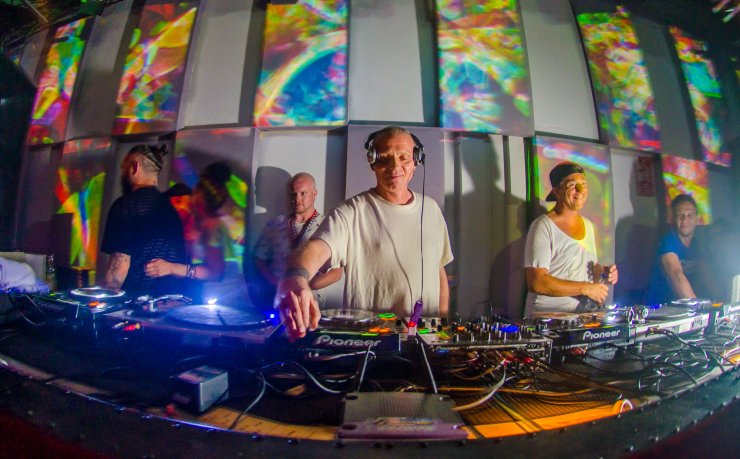
Talking Ibiza and the building blocks of clubbing culture with the Dance 88/89 residency at Sankeys. I saw you on a panel at the International Music Summit in May and you had great feedback on the opening. Over your further four dates there, how do you think the season has gone considering it's the first year?
"I think it's gone really well. The crowds have been 500-800/900 every week. Ibiza is a strange place to throw an event and when you do a new event, everybody hears about it, but very few people actually go and the ones that do go will tell their friends that it's good. In the second season, those that have been hearing about it and wanted to go, but didn't will go, and then it starts to kick in, and then in the third season, it really happens. That's very normal for Ibiza, so I think that for the first season to have between 500 and 1,000 people every week is quite fantastic. Each time I've been there there have been lots of younger ravers who want to know more about the culture they love. It's given it a certain energy and impetus. I'm definitely looking forward to the closing party."
From the vast amount of music available, what have you been digging in to play at Dance 88/89?
"I've been keeping my music all 1988/89. Detroit techno, acid Chicago house, New York house, UK acid house, some great Italian music, Belgian new beat and some good German music from around those times. I've just about dipped my toes in. There's so much music and all the DJs that have been coming have been playing good quality music and a lot of tracks that people don't even know. There's still a lot of music from the late '80s that haven't yet been heard. I think this education can go on for a long time."
In light of us looking to the formative years of dance music, there seems to be some dissatisfaction at the moment with mundane material that lacks originality. Would you agree?
"Well I hope you're right because the generic stuff winds me up. I go out and I hear people play generic nonsense. It all sounds the same and it's like, come on what happened to proper basslines, trippy noises, acid lines and mischievous music that's naughty, playful and fun? Everyone is getting into this boring deep groove and while it's nice to have deep stuff for after hours and early doors, people want to dance and people want to celebrate life and have fun. A lot of people are forgetting that and I think younger producers out there are copying their heroes and peers, it all seems to be going round in little circles. But there is always good music coming through. It just means that DJs that do have integrity and want to keep pushing the boundaries have to dig a little deeper to find the music."
Do you miss anything from those heady acid house years? Or are you all about appreciating how dance music has progressed and living in the present?
"I don't miss anything from the formative years. I think nostalgia sucks and I think people need to get a grip. Music is getting better all the time and the parties are getting better all the time, along with the production, sound systems and lighting. There's a lot of good stuff out there and I think we need to be moving forward and we need to remain innovative. It's nice that there´s retro nights like dance 88/89 that are going to educate people and allow us older DJs to play the music that helped create a scene and share that, but I don't actually miss anything about the old days. I do look back on it with fondness, don't get me wrong, as some of the best nights of my life were in 1998 at Clink Street. Incredible, but miss it? I've never been one for missing things. I get people asking me if I miss The End after closing that and that was the best nightclub in the world. Today I'm getting the excitement of travelling around the world and playing brand new innovative, upfront, exciting music. I get excited when I listen to new tunes that sound different and fresh and I get excited and I want to share that. That for me is where it's at, and my heart is in modern innovative music - music for the future and music for tomorrow."
You had your own residency in Ibiza with Superfreq from 2002 to 2008. Could we see it returning to the island?
"I want to bring Superfreq back to the island and I've actually been talking to Sankeys because it would be nice to do it in the other room on a Wednesday, but we'll see. I'm doing a lot with the label and the events right now. I've been a digital only label for three and a half years, but I'm taking it back to vinyl starting from next year. I'm really stepping things up with releasing artist albums and compilation albums, and I've stepped it up with the London events because before I was doing fabric parties twice a year, but the rest of the parties I'd do them more boutique in small warehouse spaces for 300-400 people. Now I'm doing parties at The Steelyard – a fantastic new venue in London - and that holds 1,000 people. I've been getting bigger name DJs and more impressive line-ups. So with all that happening I'm really pushing the Superfreq brand in general and it'd be good to bring that over to Ibiza again next year."
You've been living in LA over the past seven years, how is life over there for you?
"It's amazing, I absolutely love living here. I'm only here half the time and the other 50% of the time I'm gallivanting across the world playing music. I'd like to spend more time here, but it's a great place to come home to. The quality of life is amazing, the weather is amazing, you get decent property for your money and the people are really friendly. I think my favourite thing about LA is the food and the produce. The organic produce is amazing and the taste of the food is unreal, so that's really good if you're into looking after yourself and eating well."

One of the main reasons you moved to LA was to pursue acting - you studied the spiritual psychology of acting. I for one hadn't heard of it before, can you tell me more about it?
"OK, well it's the brainchild of my tutor John Osborne Hughes who lives in London. He does workshops for meditation and creative visualisation - I also teach mediation. That's directly inspired by Hughes, but he also teaches the spiritual psychology of acting in London, New York and LA. It's based on method acting and the methods of Stanislavski and Michael Chekhov, which is the mainstay of method acting. But he adds to that spirituality - mostly Buddhism - so meditation is a big part of it. It's a fantastic hybrid of two very different things - of spirituality and method acting. I studied with him for five years on a weekly basis and it's the next step forward for method actors. It's next level."
Is it a new form of method acting practice?
"It's new and exclusively done by John Osborne Hughes. As far as I'm aware there are no other acting tutors in the world to have combined the teaching of Stanislavski method acting with spirituality, positive thinking and meditation, and that's what the spiritual psychology of acting is."
So the core of it is tuning into a character through a higher state of consciousness to be able to portray them with a different level of intensity?
"That's what method acting is. Method acting is about actually becoming the character. So you have the script and you have the character playing a certain role during the life of the script but you have to ask yourself what made that character who they are. Let's say the character is a right arsehole - what made the character a right arsehole? You have to study the actions of the character and work out why he's making those actions. Where the spirituality side comes in - it gives the actor confidence, artistic creativity and a certain knowing that allows them to create their own future as a real individual to make the character better. Also, meditation helps character actors come out of their role. We've seen it when actors like Heath Ledger, who'll come out of a role after getting deep into the psyche of a character and this has psychological effects. Meditation in this way is vital for the sanity of the actor - it separates you and your own subconscious and psychological outlook."
What projects have you been involved in so far to flex your skills?
"I've done a short film called Desire, where I played a couple of cameo roles. One was playing a drunk which is kind of easy for me and the other was as a movie director's assistant. I haven't done much yet and I do feel like I need to sharpen my tools, which I will be doing with Hughes in the coming months, but I feel like I could play any actor whatsoever because of my knowledge of method, spirituality and the belief in myself. I will be pushing it in the future for my latter years."
You wouldn't have needed to use method acting to get into the role of the drunk, eh?
"No, exactly, not at all. I was like, what level of drunk do you want me to be? Let's go for a seven. It's something I'm quite an expert at."
Going back to meditation. You've been practicing for some time now, haven't you?
"I started meditation when I was 17. I was introduced to meditation and the law of attraction, positive thinking and making dreams come true back at that age, and it's been the foundation of all my success throughout my life. I share that and I like to teach people to heal themselves because it's vitally important. I think all children from the age of 10 upwards should learn meditation. Get rid of assembly and at the end of school have another guided mediation to thank for the information that's come in. Believe me, children would double their capacity for learning."
"Most DJs believe that there´s a power in the dance and in the rhythm. It´s scientifically proven there´s power in the rhythm with alternations between speeds changing your consciousness."
You also speak a lot on music as meditation. The practice can then be applied to a lot of daily activities, can't it?
"Concentration is meditation. When you're on the dance floor and you're dancing, listening to the music and completely in the moment - that's meditation. You can meditate walking up the street as long as you come into the moment and can appreciate what's going on around you and concentrate on your breathing. Concentrating on your breathing is mindfulness meditation and that can be done when you're in the gym, it can be done when you're fucking, and it can be done when you're dancing. Concentrating on something that's happening now will get rid of the thoughts of the problems of yesterday and bring a possible solution for tomorrow - that's meditative."
Would you say that DJs who appreciate the worth of meditation and understand the benefits of introspective exploration when in the booth are able to make a stronger connection with the crowd?
"Are there any other DJs that do? (Laughs). I think most believe that there's something out there and there's a greater consciousness. Most DJs believe that there's a power in the dance and in the rhythm. It's scientifically proven there's power in the rhythm with alternations between speeds changing your consciousness. So I think there are DJs that know there's a power in the dance, but I'm not sure if there are any who would be into what I'm into."
Psychedelics also allow the mind to connect with a higher state of consciousness. I know you have a love for your psychedelics. Seth Troxler is also one who said that without experiences on LSD, he doesn't think he'd have the skills and the musical intuition to do what he does today. Would you agree that these experiences can also help musicians and artists?
"I love psychedelics. I think a lot of DJs have been on a lot of magical journeys. I think that's the reason a lot of DJs are in the industry for the right reasons. For those who have experimented, it would be nice to see them take it further using meditation, mindfulness and psychology and bring that into their music as well. I'm a big fan of Seth Troxler and there needs to be more of those guys around. All psychedelics are amazing - they're fantastic for connecting you as one to the absolute, and that's what meditation is all about. Psychedelic experimentation is vital for the evolution of electronic music and the arts in general."
Catch Mr. C at the Dance 88/89 closing at Sankeys on Wednesday 28 September. 'Stand Up' will be released and appear with the remixes on 30 January and his forthcoming album, Incidents, drops on 6 March.
WORDS | Aimee Lawrence
